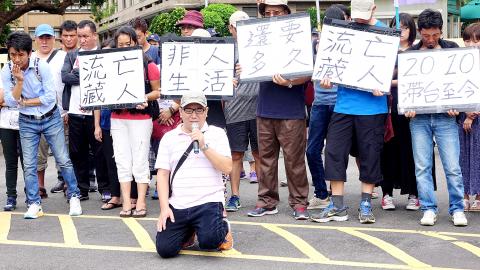Several exiled Tibetans, accompanied by the Taiwan Association for Human Rights and other groups, held a demonstration in front of the Executive Yuan in Taipei yesterday, protesting that they cannot renew their passports, leave the nation, work or join the National Health Insurance system.
Sobbing and kneeling on the ground, the exiled Tibetans said they are worried that they will not even be able to see a doctor if they get sick and they hope the new government can help solve the problem.
“How long do we have to live this inhuman life,” the exiled Tibetans and members of the Taiwan Association for Human Rights, the Union of Excluded Immigrants, the Taiwan Tibetan Welfare Association and other groups chanted.

Photo: Liu Hsin-de, Taipei Times
In September 2014, a group of exiled Tibetans who have been in Taiwan since 2009 began seeking the help of legislators and the Mongolian and Tibetan Affairs Commission to solve the problem that they are unable to renew the passports they used to travel to Taiwan.
According to Article 16 of the Immigration Act (入出國及移民法), the situation of Tibetans who entered Taiwan before the end of 2008 has been solved, but the situation of 17 exiled Tibetans who arrived in Taiwan after that date remains unresolved.
Taiwan Association for Human Rights secretary-general Chiu E-ling (邱伊翎) said the exiled Tibetans have already petitioned the Mongolian and Tibetan Affairs Commission on Oct. 28 last year and the commission had agreed to “restart an investigation” into the individual cases, but the problem still remains.
She said the commission is at fault for inertia, so she is fine with the government abolishing the commission, but she wants to know what the Executive Yuan plans to do to deal with the problem.
Exiled Tibetan Chime Dhondup said his life in Taiwan is very hard because he does not have identification and one time he felt really bad because he went to see a doctor about a stomachache, but did not have a National Health Insurance card.
Dhondup knelt on the ground and asked the government to help him.
Yeshi Dolkar, another exiled Tibetan, said he does not dare go and visit a doctor even when he is sick and he is really worried what would happen if he suffers a serious ailment.

ANOTHER EMERGES: The CWA yesterday said this year’s fourth storm of the typhoon season had formed in the South China Sea, but was not expected to affect Taiwan Tropical Storm Gaemi has intensified slightly as it heads toward Taiwan, where it is expected to affect the country in the coming days, the Central Weather Administration (CWA) said yesterday. As of 8am yesterday, the 120km-radius storm was 800km southeast of Oluanpi (鵝鑾鼻), Taiwan’s southernmost tip, moving at 9kph northwest, the agency said. A sea warning for Gaemi could be issued tonight at the earliest, it said, adding that the storm is projected to be closest to Taiwan on Wednesday or Thursday. Gaemi’s potential effect on Taiwan remains unclear, as that would depend on its direction, radius and intensity, forecasters said. Former Weather Forecast

As COVID-19 cases in Japan have been increasing for 10 consecutive weeks, people should get vaccinated before visiting the nation, the Centers for Disease Control (CDC) said. The centers reported 773 hospitalizations and 124 deaths related to COVID-19 in Taiwan last week. CDC Epidemic Intelligence Center Director Guo Hung-wei (郭宏偉) on Tuesday said the number of weekly COVID-19 cases reported in Japan has been increasing since mid-May and surpassed 55,000 cases from July 8 to July 14. The average number of COVID-19 patients at Japan’s healthcare facilities that week was also 1.39 times that of the week before and KP.3 is the dominant

The Chinese Communist Party’s (CCP) working group for Taiwan-related policies is likely to be upgraded to a committee-level body, a report commissioned by the Mainland Affairs Council (MAC) said. As Chinese President Xi Jinping (習近平) is increasingly likely to upgrade the CCP’s Central Leading Group for Taiwan Affairs, Taiwanese authorities should prepare by researching Xi and the CCP, the report said. At the third plenary session of the 20th Central Committee of the CCP, which ended on Thursday last week, the party set a target of 2029 for the completion of some tasks, meaning that Xi is likely preparing to

US-CHINA TRADE DISPUTE: Despite Beijing’s offer of preferential treatment, the lure of China has dimmed as Taiwanese and international investors move out Japan and the US have become the favored destinations for Taiwanese graduates as China’s attraction has waned over the years, the Ministry of Labor said. According to the ministry’s latest income and employment advisory published this month, 3,215 Taiwanese university graduates from the class of 2020 went to Japan, surpassing for the first time the 2,881 graduates who went to China. A total of 2,300 graduates from the class of 2021 went to the US, compared with the 2,262 who went to China, the document showed. The trend continued for the class of 2023, of whom 1,460 went to Japan, 1,334 went to